Overclocking my RX 580, is overclocking a good idea? // Overclockeando mi RX 580, ¿es buena idea overclockear? (ENG/ESP)
➤ El overclock es algo que seguro muchos hemos escuchado, para resumirlo es la forma de aumentar la velocidad de distintos componentes de nuestro ordenador para obtener un mejor rendimiento. Podemos overclockear desde el procesador, nuestra GPU e incluso las memorias rams aumentando sus mhz. Donde es más común es ver estos overclocks en procesadores, sobre todo porque la mayoría de procesadores están hechos para eso y cada uno ya viene especificado con sus frecuencias máximas, y es aún más fácil hacerles overclocks. Lo complicado es en las GPU's, y esto es lo que veremos aquí con mi tarjeta gráfica.
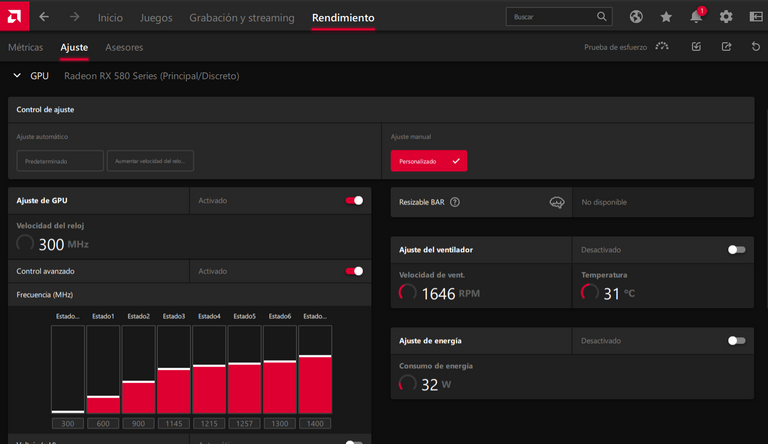
➤ Antes de hacer un overclock a una tarjeta gráfica tenemos que tener varios factores en cuenta, y el primero es si saber si valdrá la pena. A esto me refiero a si obtendremos una verdadera mejora de rendimiento, ya que no todos los overclocks son iguales, y no todos nos darán una mejora brutal. Puede ser incluso una mejora tan pequeña que no se pueda notar, pero todo esto dependerá de nuestra tarjeta gráfica y lo mejor es ver comparativas en internet. Junto a eso también tendremos que tener en cuenta en que cuando hacemos overclock las temperaturas pueden aumentar, por lo que necesitaremos una muy buena disipación y pasta térmica que no se encuentre ya en mal estado. Y junto a esto tendremos que tener cuidado con la cantidad de overclock que hagamos, porque pueden llegar a ser inestables y provocar crash, o incluso daños en los chips de la gráfica, también pueden aumentar el voltaje e ir degradando los componentes y añadido a eso aumentar aún más la temperatura. Tendremos que fijarnos siempre en intentar hacer un overclock lo más estable posible, aunque siempre está la opción de hacer un underclock, que consistiría en bajar el voltaje de las fases para hacer que caliente y consuma menos, pero al menos yo esto prefiero no hacerlo.
➤ Los valores stocks de mi gráfica en concreto eran 1750mhz de Memory Clock acompañados de 1340mhz de Core Clock. Estos dos valores son los que podremos overclockear y cada uno puede darnos una ventaja en rendimiento bastante notable si los aumentamos, siendo mi caso aumentando el memory clock hasta 2000mhz y el core clock hasta 1400mhz, pude obtener una mejora de rendimiento entre un 10-20% en total. Que aunque suene como si fuera poco, en realidad es bastante.
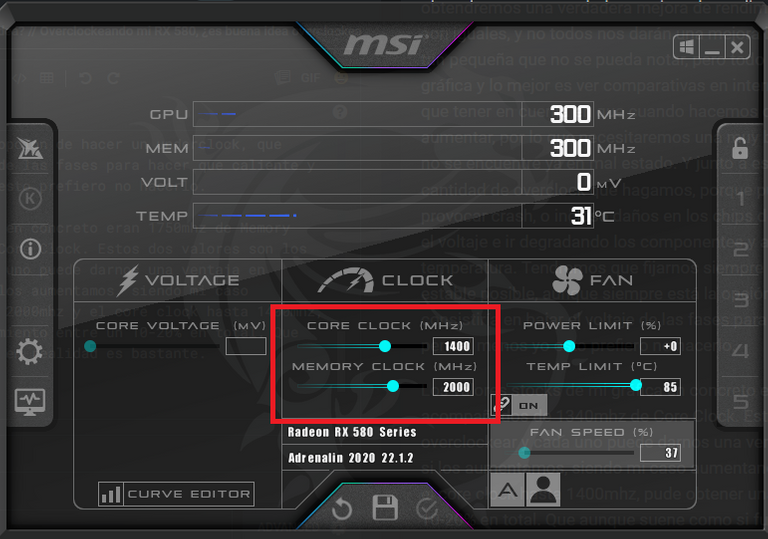
➤ Todo esto lo hice con el driver de mi tarjeta gráfica, realmente el sistema de AMD es bastante completo, no sé cómo sea el de Nvidia pero en tal caso se podría usar el MSI Afterburner. Como mencioné antes lo mejor es no inventar por nuestra cuenta los valores para el overclock, es mejor investigar en internet, allí fue donde encontré el promedio para el overclock que yo hice. Así que fui probando poco a poco para comprobar que fuera estable, no quise modificar los voltajes así que decidí dejarlos en control automático, y se mantienen bastante estable sin llegar ni cerca al máximo del voltaje máximo permitido por la gráfica. Para comprobar que el overclock es estable lo primero que todo sería probarlos en juegos, en tal caso de que el overclock sea inestable o esté mal hecho pueden pasar varias cosas, como tener errores visuales, que directamente ocurra un crash, o que perdamos rendimiento. O si no que nuestra tarjeta gráfica alcance temperaturas inimaginables o voltajes no admitidos. Para poder cersiorarme de todo utilicé un programa llamado HWinfo, el cual sirve para analizar la mayoría de los sensores de nuestro ordenador en busca de problemas. Y desde allí analizar si no presenta ningún error en la memoria de la gpu, y efectivamente fue así, por lo que técnicamente mi overclock era 100% estable.
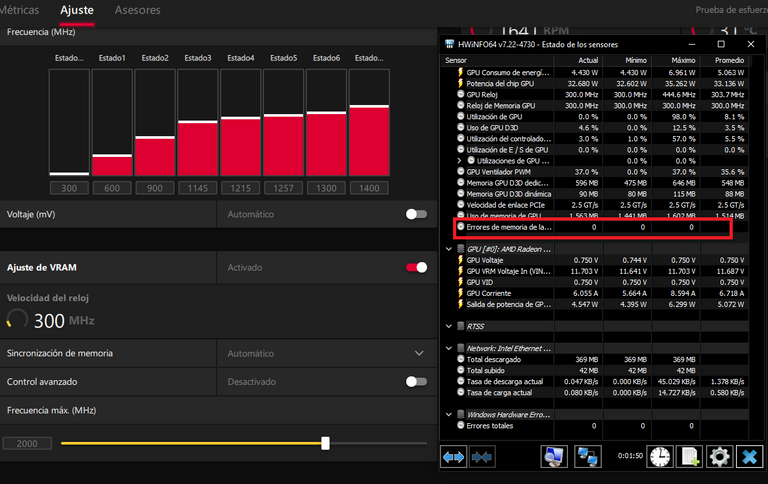
➤ Y luego llega la hora de la verdad, la prueba en juegos. ¿Hay una mejora de rendimiento? La respuesta es sí, y por completo. En algunos juegos la mejora puede ser pequeña, tal vez 2 o 5 fps, pero en otros puede notarse demasiado o si no, al menos tener los FPS más estables en cada uno de nuestros juegos. En Asassins Creed Oddysey por ejemplo antes del overclock podía jugar a una tasa de 60fps estables en la mayor parte del tiempo, algunas veces subía a 70fps, y ocurrían bajones cuando estaba en ciudades demasiado grandes, todo esto con todas las configuraciones del juego en muy alto. Luego del overclock mantenía los 70fps estables en la mayor parte del tiempo e incluso en ciudades grandes se mantenía entre 60-65 fps, sin casi nunca llegar a bajar de los 60, y es un cambio bastante considerable, porque aparte de darme más fps, también los hizo mucho más estables que antes.
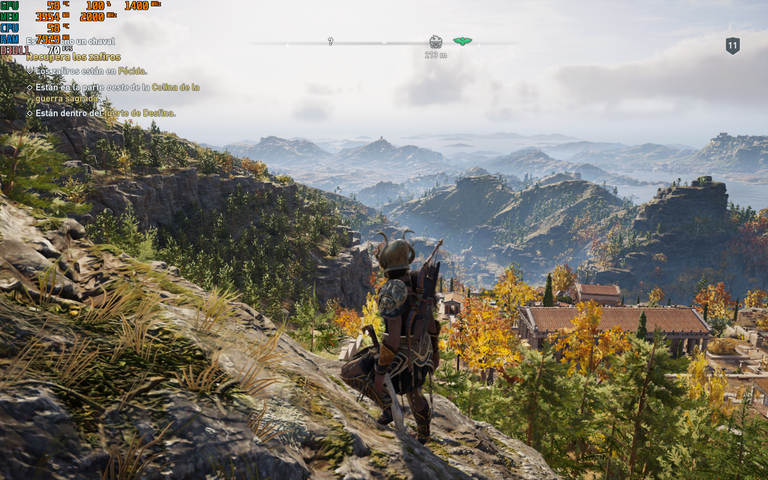
➤ Con God of War también tuve una diferencia considerable, aunque anteriormente con todos los gráficos en original ya podía jugarlo a 60fps estables esta vez pude configurarlo en gráficos originales con algunas cosas subidas a alto, (este juego en gráficos altos consume muchísimo), y mantenía los 60fps estables sin problema cuando antes por hacer esto aunque era jugable sí tenía bajones, aunque esto depende de qué configuración en específico subamos. Así que también fue una mejora bastante satisfactoria. Sobre todo porque son juegos exigentes, probablemente con juegos menos demandantes las mejoras sean aún mejor.
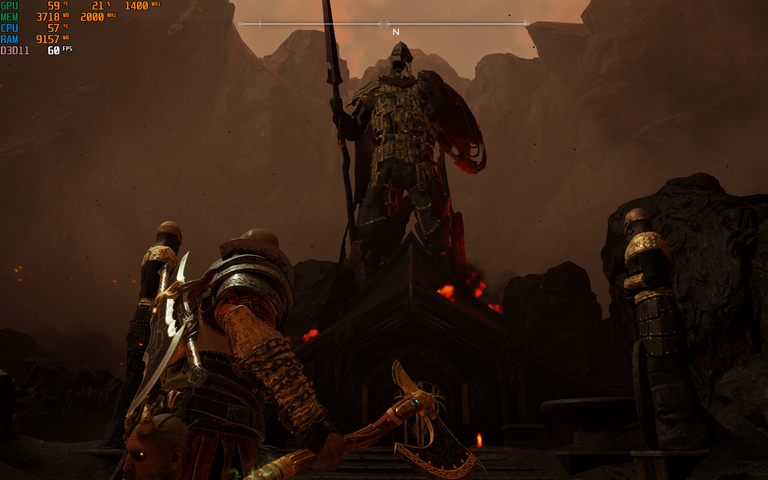
➤ Casi lo olvido mencionar, con todo este overclock las temperaturas de mi GPU se mantuvieron exactamente igual que antes, no hubo ningún cambio, al igual que los voltajes también se mantienen casi iguales y en términos más que correctos. El último juego que probé fue Elden Ring. Anteriormente podía jugarlo con todos los gráficos en alto a 60fps estables, y ahora con el overclock configuré el juego con todo en ultra bajando únicamente una o dos cosas a alto, y mantenía 60fps estables sin ningún problema. Por lo que también es un cambio bastante grande y satisfactorio. Con los valores stocks también podía jugar con todo en ultra pero con ciertos bajones de FPS.
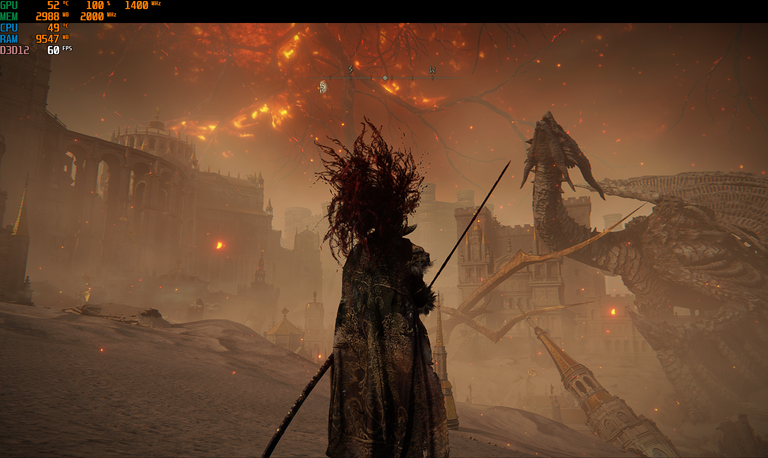
➤ Creo que hacer un overclock siempre que tengamos las condiciones adecuadas para poder hacerlo, vale totalmente la pena, o al menos para mí, ha sido una mejora y un cambio bastante placentero. Esto es todo por ahora, espero pueda servirles de ayuda, muchas gracias por haber leído, ¡nos vemos en el próximo post!
All images are by me.
English Version
➤ The overclock is something that surely many of us have heard, to summarize it is the way to increase the speed of different components of our computer for better performance. We can overclock from the processor, our GPU and even the memory rams increasing their mhz. Where it is more common is to see these overclocks in processors, especially because most processors are made for that and each one is already specified with its maximum frequencies, and it is even easier to overclock them. The complicated thing is in the GPU's, and this is what we will see here with my graphics card.

➤ Before overclocking a graphics card we have to take several factors into account, and the first one is to know if it will be worth it. By this I mean whether we will get a real performance improvement, since not all overclocks are the same, and not all will give us a brutal improvement. It may even be such a small improvement that it can not be noticed, but all this will depend on our graphics card and it is best to see comparisons on the internet. Along with that we will also have to take into account that when we overclock the temperatures can increase, so we will need a very good dissipation and thermal paste that is not already in bad condition. And along with this we will have to be careful with the amount of overclock we do, because they can become unstable and cause crashes, or even damage to the graphics chips, they can also increase the voltage and degrade the components and added to that further increase the temperature. We must always try to make an overclock as stable as possible, although there is always the option of making an underclock, which would consist of lowering the voltage of the phases to make it hotter and consume less, but at least I prefer not to do this.
➤ The stock values of my graphics card in particular were 1750mhz of Memory Clock accompanied by 1340mhz of Core Clock. These two values are the ones that we can overclock and each one can give us an advantage in performance quite remarkable if we increase them, being my case increasing the memory clock up to 2000mhz and the core clock up to 1400mhz, I could get a performance improvement between 10-20% in total. Although it sounds like it is little, it is actually quite a lot.

➤ I did all this with my graphics card driver, actually AMD's system is quite complete, I don't know how Nvidia's is but in that case you could use MSI Afterburner. As I mentioned before it is best not to invent the values for the overclock on our own, it is better to research on the internet, that's where I found the average for the overclock I did. So I was testing little by little to check that it was stable, I didn't want to modify the voltages so I decided to leave them in automatic control, and they remain quite stable without reaching even close to the maximum voltage allowed by the graphics card. To check that the overclock is stable the first thing to do would be to test them in games, in such a case that the overclock is unstable or is poorly done several things can happen, such as having visual errors, that a crash occurs directly, or that we lose performance. Or our graphics card may reach unimaginable temperatures or unsupported voltages. In order to make sure of everything I used a program called HWinfo, which is used to analyze most of the sensors of our computer looking for problems. And from there analyze if it does not present any error in the memory of the gpu, and indeed it was so, so technically my overclock was 100% stable.

➤ And then comes the moment of truth, the gaming test, is there a performance improvement? The answer is yes, and completely. In some games the improvement may be small, maybe 2 or 5 fps, but in others it may be too noticeable or if not, at least have the most stable FPS in each of our games. In Asassins Creed Oddysey for example before the overclock I could play at a stable 60fps rate most of the time, sometimes it would go up to 70fps, and dips would occur when I was in too big cities, all this with all the game settings on very high. After the overclock it kept the 70fps stable most of the time and even in big cities it stayed between 60-65 fps, almost never dropping below 60, and it's quite a considerable change, because apart from giving me more fps, it also made them much more stable than before.

➤ With God of War I also had a considerable difference, although previously with all the graphics in original I could play it at 60fps stable this time I could configure it in original graphics with some things raised to high, (this game in high graphics consumes a lot), and maintained the 60fps stable without problem when before to do this although it was playable it did have drops, although this depends on what specific configuration we raise. So it was also a quite satisfactory improvement. Especially because they are demanding games, probably with less demanding games the improvements will be even better.

➤ I almost forgot to mention, with all this overclock my GPU temperatures remained exactly the same as before, there was no change, just like voltages also remain almost the same and in more than correct terms. The last game I tested was Elden Ring. Previously I could play it with all graphics on high at stable 60fps, and now with the overclock I set the game with everything on ultra lowering only one or two things to high, and it maintained stable 60fps without any problems. So it's also a pretty big and satisfying change. With the stock settings I could also play with everything in ultra but with some FPS drops.

➤ I think overclocking as long as we have the right conditions to be able to do it, is totally worth it, or at least for me, it has been an improvement and a quite pleasant change. This is all for now, I hope it can be of help, thank you very much for reading, see you in the next post!
All images are by me.
Te pasas de temerario vale :ooououo:
A mi el tema del overclocking siempre lo he tenido de lejitos pero ya veo que realmente, como dices, con las condiciones adecuadas no pasa nada, ya voy a salir a quemar mi Pentium y 9400 GT para que corra el NieR Automata, yesyes.
El overclock es mi vida, nací por el overclock :uououou:
JAJAJSJADAJ, ya eso es irse de locos overclockear la pobre 9400gt, pero epa, no te creas, tu procesador sí puedes. Varios core duo overclockee yo XD
listo pues, overclokiaaa 😈
El unico problema del overclock es el calentamiento y el consumo de energia, si ambas estan bien, todo rueda y me encanta como te corren esos juegos sin mayor problema :D
¡Exacto! Hay que tener cuidado con el calentamiento y el consumo de energia que puede tomar, por eso necesitamos de una buena disipación junto a pasta térmica, y encima a eso en tal caso controlar los voltajes. Gracias por comentar!
Siempre que le vea por alli en algun post y tenga tiempo para leerlo lo comentare, saludos :3
¡Enhorabuena!
✅ Has hecho un trabajo de calidad, por lo cual tu publicación ha sido valorada y ha recibido el apoyo de parte de CHESS BROTHERS ♔ 💪
♟ Te invitamos a usar nuestra etiqueta #chessbrothers y a que aprendas más sobre nosotros.
♟♟ También puedes contactarnos en nuestro servidor de Discord y promocionar allí tus publicaciones.
♟♟♟ Considera unirte a nuestro trail de curación para que trabajemos en equipo y recibas recompensas automáticamente.
♞♟ Echa un vistazo a nuestra cuenta @chessbrotherspro para que te informes sobre el proceso de curación llevado a diario por nuestro equipo.
Cordialmente
El equipo de CHESS BROTHERS
Gracias por el apoyo!
Hermano que buena informacion. Sabia que existia un metodo para cambiar los valores de tu gpu pero no sabia que se llamaba asi. Es muy buena informacion. ¿Esto se podra hacer para telefonos? Y otra cosa mas mi amigo, si se realiza en la pc la mineria seria un poco mas rapida no? 👍 @rishaph
Para teléfonos creo yo que no es posible, o al menos nunca he visto algo así ni creo que sea aconsejable por la arquitectura bajo la que se construyen los celulares. Para una PC de mineria efectivamente también se puede hacer overclocking a las gpu para mejorar su rendimiento en mineria, pero para eso es un overclock totalmente diferente al que realizas para mejorar en gaming, eso podrías informarte mejor investigando en internet!
Me interesa mucho el tema del overclocking pero no quiero quemar el i3 de primera que tengo, quiza luego lo intente con mi alcatel xD
De que puedes hacerle overclock sin ningún problema puedes, realmente xD
Yo le he hecho overclocks incluso a core duos, me refiero a los pentium dual core de esos de 2007
esas capturas se ven uffff mano ojala te dure el rendimiento es lo unico que me preocupa de hacer eso, pero bueno ya me veo en mi canaima jugando Space Citizen con esto 😎
verga loco me acabo de dar cuenta que no respondí esto, perdón bb. Gracias por tu comentario hermanazo, hora de overclockear la canaima tuneada, por ahora el rendimiento se ha mantenido bastante bien!
Hola @rishahp, agradecemos tu confianza en elegirnos como comunidad para compartir tu contenido sobre tecnología y videojuegos. Recientemente hemos actualizado las normas de la comunidad. Para nosotros es importante que las puedas leer y una vez leídas, dejar un comentario en ese post, cómo constancia que lo hiciste y así poder asignarte el rol de geek verificado. En ese post puedes conocer más detalles sobre lo que trata esta comunidad y referente al rol. ¡Gracias!
¡Hola! Gracias por su comentario y confianza, sobre todo por la información y haberme tomado en cuenta para la asignación del rol. Ya voy en camino a leer el post y dejar mi comentario, ¡gracias!